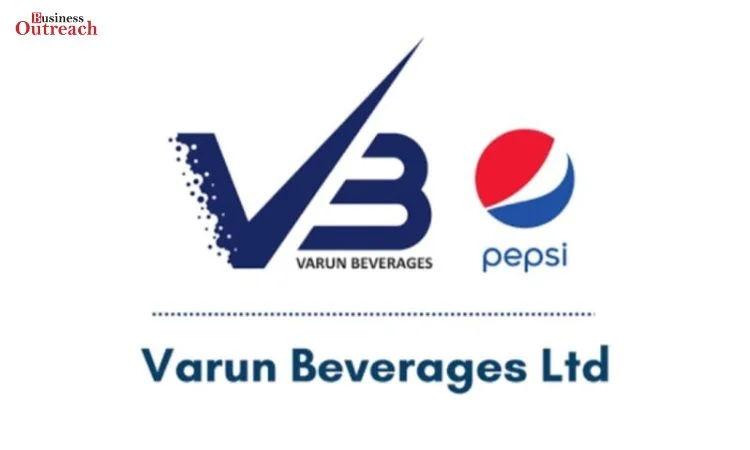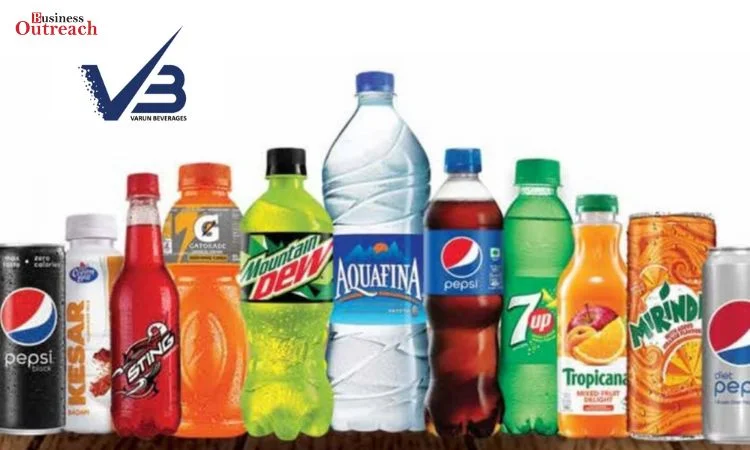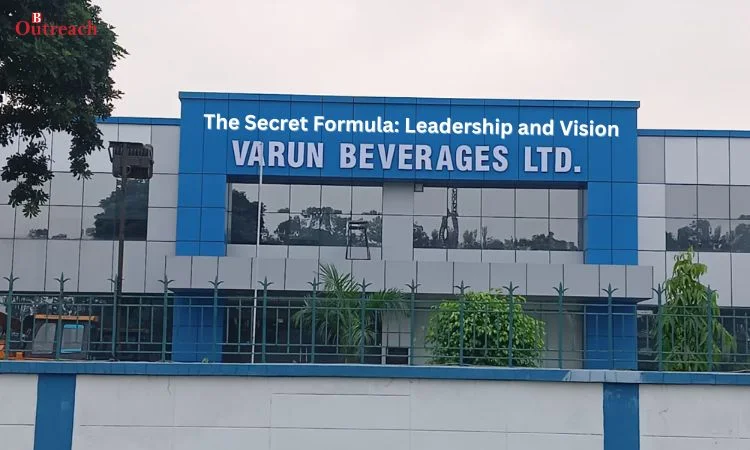Every time you grab a Pepsi, Mirinda or Mountain Dew on a summer day, have you ever thought about the company that produces them? Allow me to take you through the bright world of Varun Beverages Limited (VBL) the behind the scene star player which has been satisfying the thirst of millions globally.

| Table Of Contents |
| Humble Beginnings: The Start of Varun Beverages |
| The 2000s: Dozens of Partnerships Over the Decade |
| Expanding the Fizz: Acquisitions and Growth Strategies |
| A Milestone Year: Going Public |
| Sustained Expansion Post-2016 |
| Becoming a Global Powerhouse in the 2020s |
| The Secret Formula: Leadership and Vision |
| Commitment to Sustainability |
| Financial Success and Corporate Earnings |
| Challenges and Future Outlook |
| Conclusion |
Company Highlights
| Name | Varun Beverages Limited (VBL) |
| Founded | 1995 |
| Founder | Ravi Jaipuria |
| Parent Company | RJ Corp |
| Headquarters | India |
| Industry | Beverages |
| Operations | Worldwide |
| Key Products | Pepsi, 7 Up, Mountain Dew, Mirinda, Tropicana, Tropicana Slice, Gatorade, Sting, Creambell, Duke’s, Lipton, Aquafina |
| Major Operations | PepsiCo bottler in 27 states and 7 union territories of India |
A small start with the desire: The origins of the Varun Beverages

The company’s history of Varun Beverages was introduced back in 1995 when it became a public limited company. VBL too has an extraordinary beginning that was initiated in the year 1996 at Jaipur. But the company’s founders had some vision that was much farther than the geographical location of the Pink City.
Apparently, by the year 1999, VBL wanted to expand and started opening branches in regions like Alwar, Jodhpur, and Kosi. This early expansion was just an indication of what was in store for the company since it grew and is now one of the largest bottlers in the whole of the PepsiCo system.
| Year | Event |
| 1995 | Varun Beverages became a public limited company. |
| 1996 | VBL initiated operations in Jaipur. |
| 1999 | VBL began expansion, opening branches in Alwar, Jodhpur, and Kosi. |
| 2000s | Continued growth, becoming one of the largest bottlers in the PepsiCo system |
The 2000s: Dozens of Partnerships Over the Decade
Varun Beverages started a phase of expansion and innovation as the company stepped into the twenty-first century. The record of the company was a significant shift in the year 2004 when DBL merged with this company to lay down a better ground and branch out.
However, the company was not satisfied with this because its goal was not limited to becoming the industry’s number one franchiser of ice cream production.
The next year that was in 2013 VBL shifted a big gear when it entered into a business of manufacturing and marketing of soft drink beverages in Delhi. This acquisition was more a signal of the company’s intent in the Indian subcontinent.
Expanding the Fizz: The timing and location of acquisitions, growth strategies
There was a period of fast growth for Varun Beverages, particularly in the mid-2010s. The company embarked on making strategic acquisitions in 2015 and this saw its market size shoot to the roof. VBL secured its operations in several states of the country from Pepsi India covering Uttar Pradesh, Uttaranchal, Himachal Pradesh, Haryana and Chandigarh and the Union territory. Also, it entered into acquisition of business in Bazpur, Jainpur, Satharia, Panipat and Punjab.
These acquisitions were not about the territorial expansion alone or about consolidating the geographical presence, but about making strategic positions in the Indian beverage sector and creating the prerequisites for the further development.
A Milestone Year: This idea, called “going public”
The reporting year 2016 can be considered as a crucial year of Varun Beverages because during this year the company listed itself on NSE and BSE. This was not just an economically driven event: it was a social flag on the firm’s growth story and its intentions.
A nation’s thirst can be quenched by ensuring that adequate supplies of drinking water are provided for the people.
The subsequent years in VBL revealed it to persist in its expansionary techniques after its public listing. In 2017, The company also bought new divisions of PepsiCo India franchise area in Odisha and portions of Madhya Pradesh. This was a very wise move which helped VBL to increase its market coverage and at the same time strengthen its role as one of the major manufacturers of beverages in India.
Thus, 2018 was also marked by numerous activities aimed at the formation of a sustainable strategy for the operation of VBL. It established a new manufacturing facility in Zimbabwe, which proved that the company was looking eastward beyond the borders of India. It also got into the key agreement of the distribution of Tropicana range in North and East India and signed the deal for PepsiCo India’s franchised territories in Chhattisgarh, Bihar and Jharkhand.
Varun Beverages was already going strong by 2019. It also engaged in large acquisitions, specifically INC got West & South India sub-territories from pepsiCo. Apart from that, they also secured franchised sub-territories in Maharashtra and Karnataka and later in Madhya Pradesh. All of these actions put VBL in a more commanding position in the Indian beverage industry even beyond the regional level.
The 2020s: One can now talk about a global beverage powerhouse.
At the dawn of the decade, Varun Beverages Limited emerged from its erstwhile class of being a regional player to a global player in the beverage industry. The company was still keen on its expansionist agenda as it had been prior to the onset of the Civil War.
PepsiCo’s snack, Kurkure Puffcorn was launched in the year 2022, and VBL has started manufacturing this product in its Kosi factory, which proves it is not restricted to manufacturing beverages only. The company also diversified geographically and got into Morocco and the Democratic Republic of Congo.
Today Varun Beverages is the third largest Fast Moving Consumer Goods(FMCG) company in India and the second largest franchise of Pepsi in the world. Holding operations in six countries of the Indian subcontinent and Africa, the company offers a host of brands that are popular amongst the masses and classes; the some of the widely known brands are pepsi, mirinda, 7up, Mountain Dew, Sting, Slice, Tropicana, Aquafina, Gatorade, Lipton Ice Tea, etc.
The Secret Formula: Leadership and Vision

Leadership along with vision plays a major factor for the success in relation to the organizational structure of a firm.
Power plays an important aspect in every successful firm and of course, Varun Beverages is not exempted. Board of VBL is headed by the chairman Mr. Ravi Jaipuria, which is a part of the RJ Corp conglomerates having its diversified portfolios.
The succession policy of the company has been well determined and put in place to see that the business goes on flourishing. Ravi Jaipuria has devolved most of the mantle of leadership in the business to children; Varun handles food and beverages industry, while Devyani handles the healthcare and education industry. Such an organizing plan is forward-looking and therefore establishes the necessary foundation that paves way for future advancement and growth.
A Commitment to Sustainability
In today’s world, much more than the income is a measure of success, but the existence of a company and its intentions to become environmentally sustainable. Varun Beverages has adopted this responsibility seriously that sustainability is not just a corporate strategy, but a culture within the firm.
Thus, VBL’s mission is not only to refresh consumers but also to leave a positive imprint on the planet and serve society’s well-being. Such commitment is noticeable in their area of interest including carbon management and reduction, water, waste control, and renewed energy.
To integrate sustainability, ESG cross-functional task forces and board committees have been created in the company. Their strategy has goals on water, on the management of plastics and on climate change too.
At VBL, their youth need not celebrate it on paper alone; the firm implements environmentally friendly measures. The company has come up with plantation projects, installed energy efficient appliances in their production lines and even came up with electric vehicles for distribution. These efforts also show that VBL goes beyond obligatory measures to implement sustainability in its company.
Money Making and Corporate Earnings
The success-story of Varun Beverages is therefore not alone about the aspects of expansion and sustainability; it is also about numbers- the numbers of its Vertical growth rate. However, there has been good profit growth, which is even more impressive at 47 percent. 3 percent over the past five years compounded annually on average.
Bridging between the Value and Growth funds, VBL has consistently sustainable net profit margins as it has an eminent Return on Equity (ROE) 35. Increased in the last year, 2 % to be precise. It has been observed that through the particular period the company has demonstrated high sales growth which has a Median of 21 percent. from about eight percent in the turn of the year 2000 to about eight percent in the turn of the year 2010.
Another factor that significantly contributes to the generation of its financial benefits is the proper regulation of the CCC, which defines working capital management. Such a sound financial management of the funds is noticeable by investors.
In the following digest, one is able to look at the shareholding pattern of Varun Beverages with quite some interesting trends over the periods. As for the main investors, still retaining the controlling stake but gradually decreasing, it has been at 65. , from 82% in 2021 to 62. As seen in figure 4, the percentage ratio has been on the rise consistently to reach 91% in March 2024; Foreign Institutional Investors (FIIs) have shown growing interest. FII stake has increased from 20 percent to around 25 percent since the beginning of the year in BSE. In 2021, it seems to have slightly increased from 73% to 25. 79% in March 2024 Improvement in the belief that JCU has a brighter future due to changes on its board was also superior.
More importantly, the increase in the number of shareholders is observed here, which might have been done most impressively. The current status of Varun Beverages up to March 2024 was over 4. 2400000 face amount that justifies the company’s popularity among eight lakh shareholders.
Challenges and Future Outlook
Nevertheless, Varun Beverages, as every other enterprise, does experience certain issues on its way to success. The threat of product substitution is an existing threat as the population today has become more conscious of their health status and as such are more likely to switch to healthier drinks. Also, there is an issue of environmental perspectives concerning plastics particularly in the beverage sector; this is a challenge as well as a potential area of creativity.
Nevertheless, the challenges could threaten VBL’s future growth Some strengths support this view: VBL has a good record in responding to market conditions and environmental conservation is another strength that puts VBL in a good light to counter the threats. The incorporation of snack foods with the Kurkure Puffcorn production is an example of growth strategy in a sector different from the company’s main product of beverages.
Therefore, it can be concluded that Varun Beverages has strong future prospects enabling the company to experience further expansion. Due to its widespread localization in the emerging region and the fact that it cooperates with PepsiCo, the business has good growth prospects. This I consider could also be an opportunity to the company’s growth in the future years given that the business is a holder of sustainable and innovation themes.
Conclusion
The story of varun beverages is not just a corporate success story but much more than that. It is a story of vision, managed growth, and change. Starting in Jaipur and growing into being one of the leading beverages companies in the world today, VBL has been characterized by great passion for growth.
However, what may be even more remarkable about Varun Beverages is its capacity to write the book on both business success together with societal corporate performance. Nowadays, it is crucial for corporations to be sustainable more than ever, and the practices of VBL imply to decrease the adverse effect on the environment.















